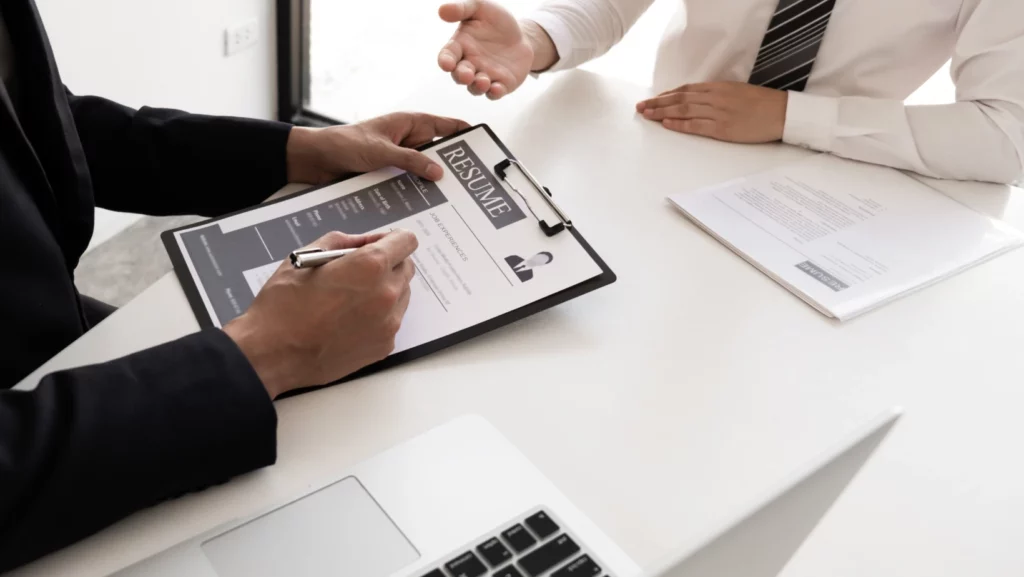Anyone who has been looking for a job recently knows what a struggle it can be. And once you find a job willing to hire, you have to sit for one of the most nerve-wracking experiences ever: the job interview. According to Indeed, the average In-person job interview lasts between 45 and 90 minutes, which can seem forever for nervous applicants.
Knowing how to prepare and what to expect and bring up during a job interview can help increase your chances of getting hired. Here are some key things to think about as you prepare for that big day with business interviews and service preparations.
Research the Company
1. Explore the company’s website, the onsite blog, and view their social media presence. A job or a company may sound good on paper and in that job description blurb. But knowing what a company is really like and what they do is critical to knowing if you are a good fit for them.
Approximately 47% of job candidates fail a job interview due to the lack of information about the company they applied for.
2. Understand the company’s mission, product or services, mission statement, and recent achievements. You will want to impress your potential future boss or manager, and knowing what the company does is critical. Showing how you will help them meet their goals will help win them over.
3. Familiarize yourself with the market trends, industry jargon, and competitor actions. Do your research and show that you are willing to try to understand the company’s goals and needs. Then work to present yourself as the answer they are looking for to address those points.
Know the Job Description and Requirements
Understanding the job requirements is paramount, so ensuring your resume effectively showcases how your skills and experiences align with the job description is critical. Often overlooked, taking time to make a resume that highlights specific qualifications can set you apart from other applicants. Tailoring your resume for each application demonstrates not only your interest in the position but also your attention to detail and dedication. Now, let’s delve into the main requirements and explore what they entail:

1. Understand the essential responsibilities and qualifications for the position. This sounds like a no-brainer, but it is imperative that you know what is expected of you in the position and what you can expect from the company. It will help avoid misunderstandings down the road.
2. Identify how your skills and experiences meet specifically listed job requirements. While a resume demonstrating your experiences and skills is good, it must be practical and applicable. Taking time to show how specific your skills meet the job requirements is important.
3. Prepare specific examples to demonstrate your qualifications. Be professional and personal when you answer questions and find a way to highlight your services and what benefits you have to offer the company. Finding ways to relate yourself to the company is always a good thing.
Practice Common Interview Questions
1. Anticipate and prepare yourself and be ready to answer common interview questions. Practicing your answers to common questions that are likely to be asked can give you the upper hand during the interview. Knowing what to expect will help keep you from being caught off guard.
2. Highlight your skills, education, experiences, and expertise to the interviewer. Provide real-world experiences and things you have done to show you are right for the job. Also, highlight work ethics, work experiences, and training that you have done that fits the job.
3. Practice answering questions with a personal story, confidence, and clarity whenever possible. Avoid canned answers and fluffy responses to interview questions. Be personal and direct and speak clearly and confidently to ensure you present yourself in a good light during the job interview.
Prepare Questions to Ask During the Interview
1. Prepare thoughtful questions regarding the company, role, or culture. By asking specific questions, you can show you are invested in the company and its unique dynamics. You will also learn more about the job and the people you might be working with if you are hired.
2. Ask about goals, team dynamics, future projects, or other things of note. Find out what you can about the short- and long-term goals and projects you might be working on with the company. This will help you both determine how good a fit you are for the job.
3. Show genuine interest in the company as well as the position being offered. Do not lie or extort your accomplishments and goals but speak sincerely and proudly of what you have done and accomplished. Paint yourself in a good but truthful light with sincere interest.
Dress Professionally and be Prepared for the Interview

1. Dress appropriately based on what you have found out about the company’s dress code. You always want to be professional when dressing for the interview. But adhering to your prospective employer’s dress code right from the start sets a good image for you in their eyes.
2. Gather copies of your resume, cover letter, other relevant documents, and bring them. Find out how many people will be at the interview and have enough copies, plus one or two extra, to hand out. Being prepared is vital to make a good impression during your interview.
3. Bring a notepad and pen for notes and ask if taking them during the interview is ok. Note specific things you want to know about the job or company. Ask about types of drug tests performed, training opportunities, and similar events to consider or plan for.
Plan Out the Logistics of the Interview Day
1. Confirm the specifics of the interview to be sure you are prepared. Double-check the interview date, time, and location as well as anything you need to know to be ready for the interview. Ensure you are prepared and know what is expected and required for the big day.
2. Plan your route in advance and consider transportation options. At least a day or two before the interview, drive to the interview location around the time of the interview. This will help you know what to consider with traffic, road works, and other possible issues with the drive.
3. Arrive at least 10-15 minutes early to demonstrate punctuality. It is always better to be 10 minutes early to any job interview than to be a few minutes late. You will want to make a good impression and show you can be reliable to be where you say you will be when you need to be.
After the hard work of landing a job interview, ensure you are ready to put your best foot forward and make a good impression. Follow these tips and be ready for your next interview and learn how to use these resources to prepare for your big day!
